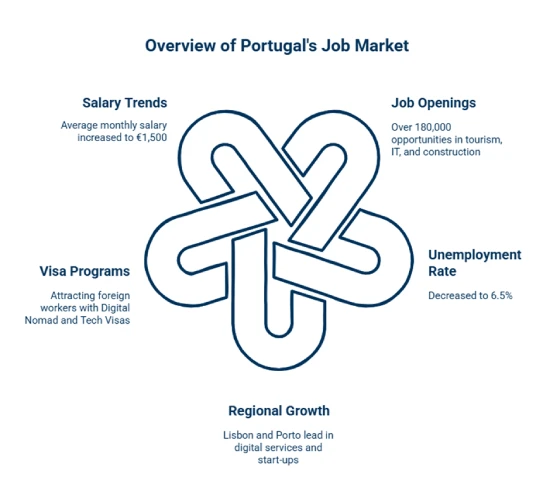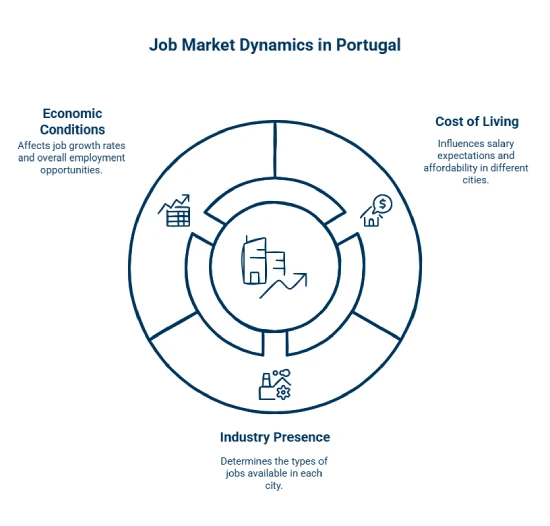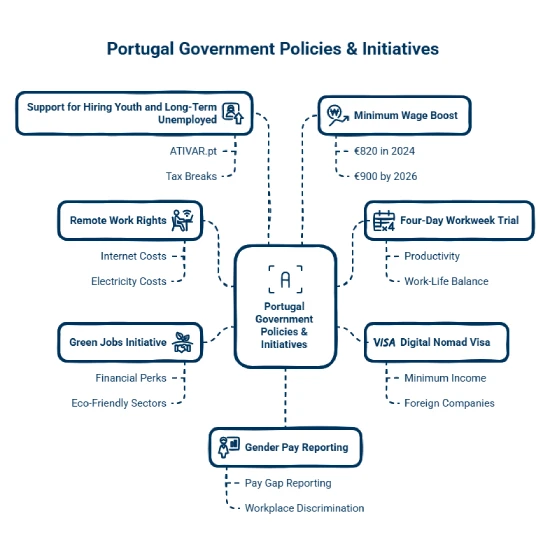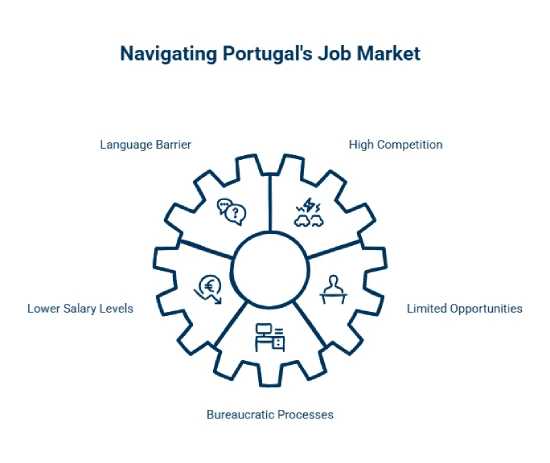Job Market in Portugal 2025-26
- Portugal has over 180,000 job openings, especially in tourism, IT, and construction.
- The unemployment rate went down to 6.5
- Lisbon and Porto are still the top spots for job growth, particularly in digital services, start-ups, and shared services.
- Portugal is drawing in foreign workers with its Digital Nomad Visa and Tech Visa, making it easier for skilled people to move here.
- The average monthly salary rose to €1,500 in 2025, with better pay in fields like IT, engineering, and finance.

Portugal Job Outlook
Portugal's job market is on the rise, thanks to more foreign investment and growth in tech and tourism. It's becoming a go-to spot for start-ups and remote work, attracting both locals and people from abroad. With unemployment dipping to around 6.5% by 2025 and digital changes influencing many industries, there is a real need for skilled workers in IT, engineering, healthcare, and renewable energy. The government's support for businesses and an influx of expats are also making the job market more flexible and accessible.
Here are some key factors affecting the Portugal job market in 2025:
- Growth in tech and digital services
- Government backing for innovation and start-ups
- Increased demand in healthcare, engineering, and tourism
- More remote work and freelance options
- Hiring boosts from international mobility programs like the Tech Visa and Digital Nomad Visa
*Want to work in Portugal? Sign up with Y-Axis guide you with the process.
In-Demand Jobs in Portugal
Portugal's economy is on the rise, creating plenty of job opportunities in areas like tech, healthcare, and tourism. With more focus on digitalization and sustainability, there are lots of chances for skilled workers and international talent to find their place in the job market here. Whether you are a software developer, a healthcare worker, or someone in hospitality, Portugal has some great job options with the potential for long-term growth.
|
Occupation |
Average annual salary |
|
IT and Software |
€ 30,000 |
|
Engineering |
€ 28,174 |
|
Accounting and Finance |
€ 25,500 |
|
Human Resource Management |
€ 30,000 |
|
Hospitality |
€ 24,000 |
|
Sales and Marketing |
€ 19,162 |
|
Healthcare |
€ 19,800 |
|
STEM |
€ 38,000 |
|
Teaching |
€ 24,000 |
|
Nursing |
€ 25,350 |
Read more…
Top in demand occupations in Portugal
Workforce requirements in different cities in Portugal
Portugal's job market changes a lot depending on where you are. Cities like Lisbon, Porto, and Braga are really popular for finding work. Things like how much it costs to live there, what industries are around, and how the economy is doing play a big role in what jobs are available. Here's a list of some of the top cities in Portugal, along with their average yearly salaries and the expected job growth rates based on government and labour data.

The table below has the list of top 10 cities in Portugal along with the average salary offered and the employment growth rate:
|
City |
Average Annual Salary (EUR) |
Employment Growth Rate (%) |
|
Lisbon |
€28,000 – €35,000 |
3.50% |
|
Porto |
€25,000 – €32,000 |
3.20% |
|
Braga |
€23,000 – €30,000 |
3.00% |
|
Coimbra |
€22,000 – €29,000 |
2.80% |
|
Faro |
€21,000 – €27,000 |
2.70% |
|
Aveiro |
€23,000 – €30,000 |
3.10% |
|
Évora |
€20,000 – €26,000 |
2.50% |
|
Setúbal |
€24,000 – €31,000 |
2.90% |
|
Viseu |
€21,000 – €27,000 |
2.60% |
|
Leiria |
€22,000 – €28,000 |
2.70% |
In-demand skills in Portugal
Portugal's job market is changing drastically due to digital shifts, healthcare demands, and global business trends. Companies are looking for individuals with technical skills and good people skills to keep up with what is needed.
The below table has details of the list of skills that are in demand in Portugal:
|
Technology Skills |
Marketing Skills |
Finance & Accounting Skills |
Healthcare Skills |
Leadership & Communication Skills |
|
Software Development (Python, Java) |
Digital Marketing & SEO |
Financial Reporting & Analysis |
Geriatric & Elder Care |
Strategic Planning |
|
Data Analysis & Power BI |
Social Media Management |
Tax Compliance & Auditing |
Clinical Nursing & Patient Care |
Team Leadership |
|
Cybersecurity & Network Security |
CRM & Email Campaigns |
Budgeting & Forecasting |
Mental Health Support |
Effective Communication |
|
Cloud Computing (Azure, AWS) |
Content Strategy & Analytics |
IFRS/Portuguese GAAP |
Medical Technology Proficiency |
Conflict Resolution |
|
AI & Machine Learning |
Brand Management & UX/UI |
Payroll Management |
Public Health & Epidemiology |
Cross-functional Collaboration |
Remote work in Portugal
Remote work has really taken off in Portugal, thanks to changes in the workplace after the pandemic and the country's push toward going digital. Data from Eurostat shows that about 25% of workers in Portugal were either fully remote or working in a hybrid setup in 2023. Fields like tech, customer service, marketing, and digital consulting are really getting into this flexible way of working. Cities like Lisbon and Porto have become hotspots for remote workers because they have great internet, plenty of co-working spaces, and friendly policies for remote jobs.
The Portuguese government has stepped in with laws to support remote work through the Labour Code. Employers now need to help cover extra costs like internet and electricity for their remote workers and make sure they are doing well. Plus, Portugal has rolled out a Digital Nomad Visa that lets foreign remote workers live and work legally in the country while they are employed by businesses overseas.
*Want to migrate abroad? Get in touch with experts at Y-Axis for complete immigration assistance!
Portugal Government Policies & Initiatives
The Portuguese government has rolled out some policies and changes to help employees feel secure and balance their work with personal life. These changes aim to improve working conditions, support remote work, and bring in talent from abroad with better visa options.
Here are a few key policies for workers in Portugal:
- Remote Work Rights: Workers can legally ask to work remotely, and employers must take care of things like internet and electricity costs.
- Four-Day Workweek Trial: In 2023, Portugal started a trial for a four-day workweek with over 40 private companies to see how it affects productivity and work-life balance, all while keeping pay the same.
- Digital Nomad Visa: This visa lets remote workers making at least €3,040 a month (four times the minimum wage) come to Portugal while working for foreign companies.
- Green Jobs Initiative: Companies that hire in eco-friendly sectors can get financial perks to help create green jobs.
- Support for Hiring Youth and the Long-Term Unemployed: Programs like ATIVAR.pt offer funds and tax breaks for employers who hire young workers, seniors, or those who have been out of work for a long time.
- Minimum Wage Boost: Portugal has been steadily raising the minimum wage, reaching €820 a month (gross) in 2024, with plans to hit €900 a month by 2026.
- Gender Pay Reporting: Companies must report on any pay gaps between genders to promote fairness and cut down on workplace discrimination.
Note: These changes are part of Portugal’s strategy to modernize its job market, look after workers, and build a more competitive and welcoming economy.

Employee Benefits in Portugal
In Portugal, employees enjoy a good range of benefits that help with financial stability, work-life balance, and overall health. These benefits are set by the country’s labour laws and apply to both local and foreign workers.
Here are the main employee benefits in Portugal:
- Paid Annual Leave: You get at least 22 working days of paid vacation each year, plus public holidays.
- Sick Leave: If you get sick, you can receive benefits from Social Security after your third day off, which covers up to 70% of your salary, depending on how long you are out and the conditions.
- Maternity & Paternity Leave: Moms can take 120 to 150 days of paid maternity leave, and dads get 28 days of mandatory paternity leave, both funded by Social Security.
- Health Insurance: While there is a public healthcare system (SNS) in Portugal, many employers also provide private health insurance as an extra perk.
- Unemployment Benefits: If you lose your job, you can apply for unemployment benefits through Social Security, based on your past earnings and contributions.
- Social Security: This covers things like pensions, disability, family allowances, and healthcare, with both employers and employees putting money into the system.
- Meal Allowance: Many jobs offer a meal card or vouchers, which is a tax-friendly bonus that’s pretty common.
- Training & Professional Development: Employers are encouraged to provide ongoing training, sometimes with support from EU funds.
- Flexible Hours & Remote Work: Employees can ask for flexible or remote work options, especially after changes made post-COVID.
- Workplace Safety: There are strict rules in place to keep workplaces safe and fair.
Job Opportunities in Portugal: Challenges for Job Seekers
Portugal's job market is changing, with growth in areas like tech, tourism, renewable energy, and customer service. But job seekers, especially those from other countries, can run into some issues while trying to find work. Knowing about these challenges can help you prepare and boost your chances of landing a job.
Here are some common hurdles job seekers encounter in Portugal:
- Language Barrier: While many people in cities speak English, knowing Portuguese is often necessary for most jobs, especially in local firms or government roles.
- High Competition: Cities like Lisbon and Porto are popular spots, which means there are plenty of applicants, making it tough to stand out, particularly in crowded industries.
- Lower Salary Levels: On average, pay in Portugal is lower than in other western European countries, which might put off some skilled workers looking for better salaries.
- Limited Opportunities in Certain Fields: Though tech and tourism are doing well, areas like research, creative arts, and humanities can have fewer job openings and slower hiring times.
- Bureaucratic Hiring Processes: Non-EU citizens might face extra paperwork and longer waits for work visas and permits.

Portugal is a great place to work, with a good quality of life, a growing start-up scene, and more foreign investment, especially in digital and remote-friendly jobs.
How to Navigate Portugal Job Market Successfully?
Finding a job in Portugal takes some planning, especially for those coming from other countries. There are plenty of jobs available in areas like tech, tourism, customer service, and green energy, but you will need to understand the local culture, the rules around employment, and speak some Portuguese to really boost your chances.
Here are some tips to help you get a job in Portugal:
- Learn Some Portuguese: Even if some positions, especially in tech or big companies, only ask for English, knowing Portuguese will make it easier for you to find work and fit in at the workplace.
- Focus on Growing Industries: Look for jobs in high-demand areas like IT, renewable energy, hospitality, customer support, and real estate since those fields are hiring a lot right now.
- Explore Local Job Sites and Network: Websites like Net-Empregos, Expresso Emprego, and LinkedIn Portugal can help you find openings. Also, try to go to industry events or networking gatherings to meet local employers and professionals.
- Adjust Your CV for European Style: Make sure your CV and cover letter are clear, professional, and meet what Portuguese employers expect. Using the Europass format can be helpful.
- Know the Visa and Work Permit Rules: If you are not an EU citizen, get to know how to navigate Portugal's work visa process, including what your employer will need to do and the requirements set by SEF (Serviço de Estrangeiros e Fronteiras).
Note: By aligning your skills with what employers want, preparing for the cultural side of things, and being strategic in your job search, you wi
ll have a better shot at finding a good job in Portugal.
*Finding it difficult to keep your resume up-to-date? Avail Y-Axis Resume Writing Services to get personalized assistance!
Portugal Job Market Summary
Portugal's job market is changing thanks to new tech, renewable energy, tourism, and foreign investment. The latest numbers show unemployment is down to 6.7% (INE, 2024), which is a good sign for the economy. Jobs are popping up in areas like IT, hospitality, healthcare, and real estate, especially in cities like Lisbon, Porto, and Braga.
It's also a popular spot for digital nomads and remote workers, with more businesses offering flexible work options. Government programs like the Portugal Tech Visa and support for start-ups are bringing in talent from around the world and helping boost innovation. Overall, Portugal has a growing and stable job market that's attractive to professionals from both the EU and outside, especially those seeking a good quality of life and career growth.
*Are you looking for step-by-step assistance for Portugal Immigration? Contact Y-Axis, the leading visa and immigration consultancy in Canada!
Looking for Inspiration
Explore what Global Citizens have to say about Y-Axis in shaping their future
Frequently Asked Questions
